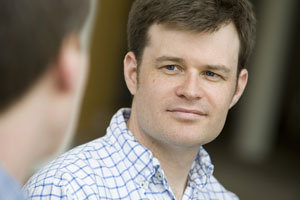Institute researcher awarded Cancer Research UK Fellowship

Cancer Research UK has awarded one of its Senior Cancer Research Fellowships for 2011 to Dr David Adams, a cancer researcher at the Wellcome Trust Sanger Institute. The £1.7 million award will support Dr Adams’ research into colorectal (bowel) cancer for six years.
Cancer Research UK is the world’s leading charity dedicated to beating cancer through research. In his studies, Dr Adams will seek to understand the development of colorectal cancer: around 110 people are diagnosed with this malignancy each day.
“I am delighted and honoured to be awarded this fellowship. Cancer Research UK has helped me in my career and research and to be recognized this way is humbling.
“I am determined that we will use the support from Cancer Research UK to get to the heart of bowel cancer – its causes, its development, its diagnosis and, we hope, its treatment.”
Dr David Adams Wellcome Trust Sanger Institute
Dr Adams joined the Wellcome Trust Sanger Institute in 2001 as a postdoctoral fellow working on mouse models of human disease. He was awarded a Cancer Research UK Career Development Fellowship in 2006. In addition to being a faculty member at the Sanger Institute, Dr Adams is adjunct-faculty at the Cambridge Cancer Research Institute.
In his recent research, Dr Adams has identified genes mutated in bowel cancer, as well as developing methods to understand how these genes drive tumour development. He also leads a large-scale effort to sequence mouse genomes, including mouse cancer genomes.
The award will allow Dr Adams to recruit additional staff to focus on the genetics of bowel cancer. His team will search for novel mutations in genes in bowel cancer and explore the significance of these mutations in mouse models of this disease. This work will help reveal how cancers evolve, a crucial step towards developing better therapies for this disease.
“This new award will continue the great work that we supported through a Cancer Research UK Career Development Fellowship to Dr Adams. We are committed to supporting groundbreaking research and to developing the next generation of research leaders.
“Dr Adams’ research has huge potential for discovering novel genes implicated in bowel cancer. He has developed world-leading approaches that have produced, and will continue to produce, new insights into this disease. This work exploits the unique environment of the Sanger Institute and its strengths in DNA sequencing, cancer genetics, mouse genetics and bioinformatics.”
Dr Simon Vincent Head of Personal Award Funding at Cancer Research UK
Cancer Research UK funds the work of individual biomedical scientists, clinical researchers and research leaders, as well as supporting research through centres of excellence in cancer across the UK, via core institutes, and through involvement in partnerships and networks.
Cancer research at the Wellcome Trust Sanger Institute began in 1999 when Mike Stratton and Andy Futreal set up the Cancer Genome Project to capitalize on the emerging human genome sequence in discovery of mutations underlying cancer. Professor Stratton is today Director of the Wellcome Trust Sanger Institute.
“This award is fitting recognition of the great work David has done to further our understanding of the genes that can contribute to cancer development. His use of mouse systems and his drive to explore further his findings in human cancer promises to provide us with profound insights into the ways in which a cell can convert itself into a cancer.
“Building on the DNA sequencing, mouse genetics and informatics at the Institute, his research should rapidly give a comprehensive framework of significant mutations in bowel cancer and, in time, lead to improved diagnosis and treatment.”
Professor Mike Stratton Director of the Sanger Institute
More information
Each year around 39,000 people are diagnosed with colorectal (bowel) cancer in the UK.
Selected websites
About Cancer Research UK
- Cancer Research UK is the world’s leading cancer charity dedicated to saving lives through research
- The charity’s groundbreaking work into the prevention, diagnosis and treatment of cancer has helped save millions of lives. This work is funded entirely by the public.
- Cancer Research UK has been at the heart of the progress that has already seen survival rates double in the last forty years.
- Cancer Research UK supports research into all aspects of cancer through the work of over 4,000 scientists, doctors and nurses.
- Together with its partners and supporters, Cancer Research UK’s vision is to beat cancer.
For further information about Cancer Research UK’s work or to find out how to support the charity, please call 020 7121 6699 or visit www.cancerresearchuk.org
The Wellcome Trust Sanger Institute
The Wellcome Trust Sanger Institute, which receives the majority of its funding from the Wellcome Trust, was founded in 1992. The Institute is responsible for the completion of the sequence of approximately one-third of the human genome as well as genomes of model organisms and more than 90 pathogen genomes. In October 2006, new funding was awarded by the Wellcome Trust to exploit the wealth of genome data now available to answer important questions about health and disease.
The Wellcome Trust
The Wellcome Trust is a global charitable foundation dedicated to achieving extraordinary improvements in human and animal health. We support the brightest minds in biomedical research and the medical humanities. Our breadth of support includes public engagement, education and the application of research to improve health. We are independent of both political and commercial interests.


